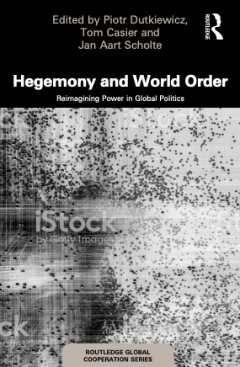EURUS Faculty Highlights: Piotr Dutkiewicz

In this series of posts, we are looking at various notable accomplishments by our faculty members and the department as a whole. This week we are celebrating Professor Piotr Dutkiewicz.
Professor Dutkiewicz recently submitted his newly edited book, Hegemony and World Order: Reimagining Power in Global Politics, to Routledge for publishing (expected release date: before 2021). See below a short overview of the book and the table of contents.
Hegemony and World Order explores a key question for our tumultuous times of multiple global crises. Does hegemony – that is, legitimated rule by dominant power – have a role in ordering world politics of the twenty-first century? If so, what form does that hegemony take: does it lie with a leading state or with some other force? How does contemporary world hegemony operate: what tools does it use and what outcomes does it bring?
This volume addresses these questions by assembling perspectives from various regions across the world, including Canada, Central Asia, China, Europe, India, Russia, and the USA. The contributions in this book span diverse theoretical perspectives from realism to postcolonialism, as well as multiple issue areas such as finance, the internet, migration, and warfare. By exploring the role of non-state actors, transnational networks, and norms, this collection covers various standpoints and moves beyond traditional concepts of state-based hierarchies centred on material power. The result is a wealth of novel insights on today’s changing dynamics of world politics.
Hegemony and World Order is critical reading for policymakers and advanced students of International Relations, Global Governance, Development, and International Political Economy.
Hegemony and World Order: Reimagining Power in Global Politics
Hegemony in World Politics: An Introduction
Jan Aart Scholte, Tom Casier and Piotr Dutkiewicz
Part One: Hegemony as a Conceptual Map
- Beverly J. Silver and Corey R. Payne, Crises of World Hegemony and the Speeding up of Social History
- Brian Schmidt, Hegemony: A Conceptual and Theoretical Analysis and its Application to the Debate on American Hegemony
- Tom Casier, Unravelling Power and Hegemony: Why Shifting Power Relations Do Not Equal a Change of International Order
- Ivan Safranchuk, Globalization and the Decline of Universalism: New Realities for Hegemony
- Jan Aart Scholte, Rethinking Hegemony as Complexity
Part Two: Practices of Hegemony
- Elinor Sloan, Hybrid War and Hegemonic Power
- Randall Germain, Global Hegemony from a Longue Durée Perspective: The Dollar and the World Economy
- Elena Chebankova, The Role of Ideas: Western Liberalism and Russian Left Conservatism in Search of International Hegemony
- Les Pal, Twilight of Hegemony: The T20 and the Defensive Re-imagining of Global Order
- Martin Geiger, Shifting Hegemonies in Global Migration Politics and the Rise of the International Organization for Migration (IOM)
Part Three: Hegemony in Action
- Yong Wang, The US-China Trade War and Hegemonic Competition: Background, Negotiations, and Consequences
- Xin Zhang, Competition in Convergence: US-China Hegemonic Rivalry in Global Capitalism
- Ravi Dutt Bajpai and Swati Parashar, India in the “Asian Century”: Thinking Like a Hegemon?
- Victoria Akchurina, On the Power of Improvisation: Why is There No Hegemon in Central Asia?
Conclusions: Hegemony and World Order
Piotr Dutkiewicz, Tom Casier and Jan Aart Scholte